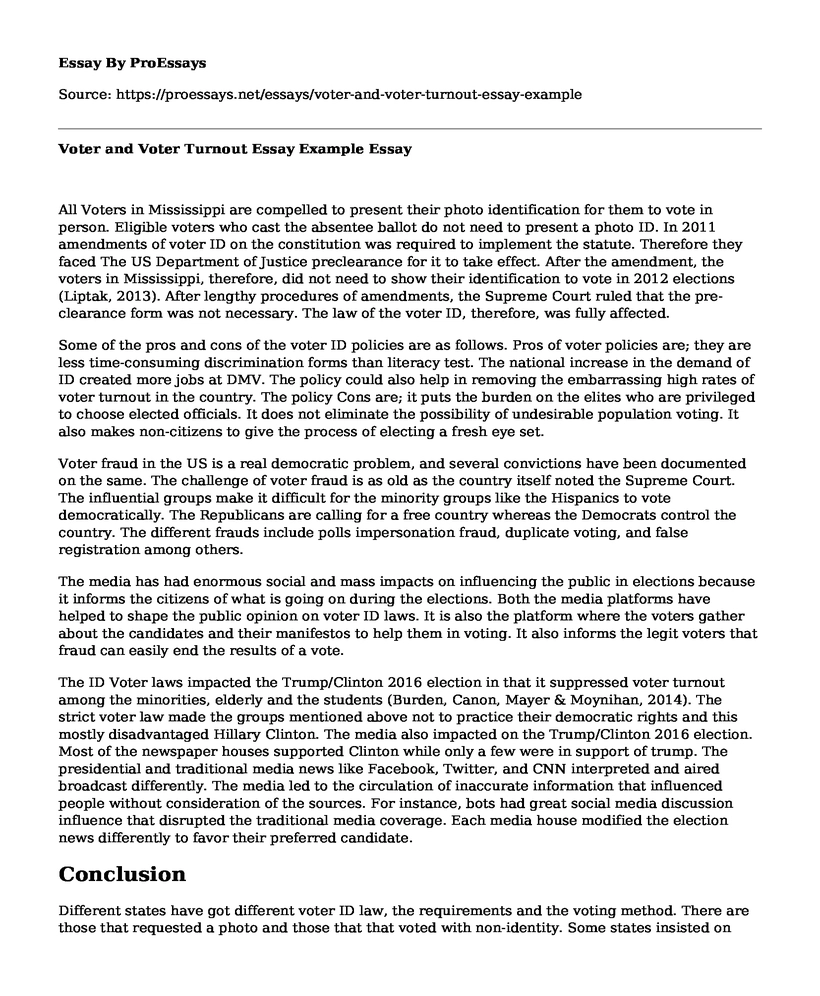All Voters in Mississippi are compelled to present their photo identification for them to vote in person. Eligible voters who cast the absentee ballot do not need to present a photo ID. In 2011 amendments of voter ID on the constitution was required to implement the statute. Therefore they faced The US Department of Justice preclearance for it to take effect. After the amendment, the voters in Mississippi, therefore, did not need to show their identification to vote in 2012 elections (Liptak, 2013). After lengthy procedures of amendments, the Supreme Court ruled that the pre-clearance form was not necessary. The law of the voter ID, therefore, was fully affected.
Some of the pros and cons of the voter ID policies are as follows. Pros of voter policies are; they are less time-consuming discrimination forms than literacy test. The national increase in the demand of ID created more jobs at DMV. The policy could also help in removing the embarrassing high rates of voter turnout in the country. The policy Cons are; it puts the burden on the elites who are privileged to choose elected officials. It does not eliminate the possibility of undesirable population voting. It also makes non-citizens to give the process of electing a fresh eye set.
Voter fraud in the US is a real democratic problem, and several convictions have been documented on the same. The challenge of voter fraud is as old as the country itself noted the Supreme Court. The influential groups make it difficult for the minority groups like the Hispanics to vote democratically. The Republicans are calling for a free country whereas the Democrats control the country. The different frauds include polls impersonation fraud, duplicate voting, and false registration among others.
The media has had enormous social and mass impacts on influencing the public in elections because it informs the citizens of what is going on during the elections. Both the media platforms have helped to shape the public opinion on voter ID laws. It is also the platform where the voters gather about the candidates and their manifestos to help them in voting. It also informs the legit voters that fraud can easily end the results of a vote.
The ID Voter laws impacted the Trump/Clinton 2016 election in that it suppressed voter turnout among the minorities, elderly and the students (Burden, Canon, Mayer & Moynihan, 2014). The strict voter law made the groups mentioned above not to practice their democratic rights and this mostly disadvantaged Hillary Clinton. The media also impacted on the Trump/Clinton 2016 election. Most of the newspaper houses supported Clinton while only a few were in support of trump. The presidential and traditional media news like Facebook, Twitter, and CNN interpreted and aired broadcast differently. The media led to the circulation of inaccurate information that influenced people without consideration of the sources. For instance, bots had great social media discussion influence that disrupted the traditional media coverage. Each media house modified the election news differently to favor their preferred candidate.
Conclusion
Different states have got different voter ID law, the requirements and the voting method. There are those that requested a photo and those that that voted with non-identity. Some states insisted on having identification documents with photo ID such as driver's license, state ID, military ID among others to vote. While other states accepted no photo ID, they only needed documents like bank statement with names to vote. The two approaches followed the strict and non-strict approach depending on the states to vote.
References
Burden, B. C., Canon, D. T., Mayer, K. R., & Moynihan, D. P. (2014). Election laws, mobilization, and turnout: The unanticipated consequences of election reform. American Journal of Political Science, 58(1), 95-109.
Liptak, A. (2013). Supreme court invalidates key part of voting rights act. New York Times, 25.http://www.ncsl.org/research/elections-and-campaigns/voter-id.aspx
Cite this page
Voter and Voter Turnout Essay Example. (2022, Nov 20). Retrieved from https://proessays.net/essays/voter-and-voter-turnout-essay-example
If you are the original author of this essay and no longer wish to have it published on the ProEssays website, please click below to request its removal:
- Three Strike Law in Prisons: Alternatives, Effectiveness, Equity, Financial feasibility
- Managed Care - Healthcare Administration Major
- Essay on Elections in the UK
- Canada's Crime Capital Paper Example
- Essay on Voters' Healthcare Priorities: ACA vs. HEART Ahead of 2020 Election
- Essay Example on Essential Human Right: Access to Clean Water & Sanitation
- Essay Example on American Elections







